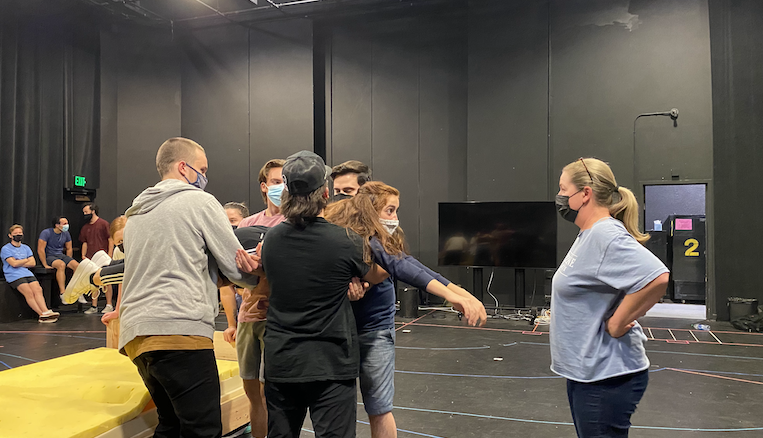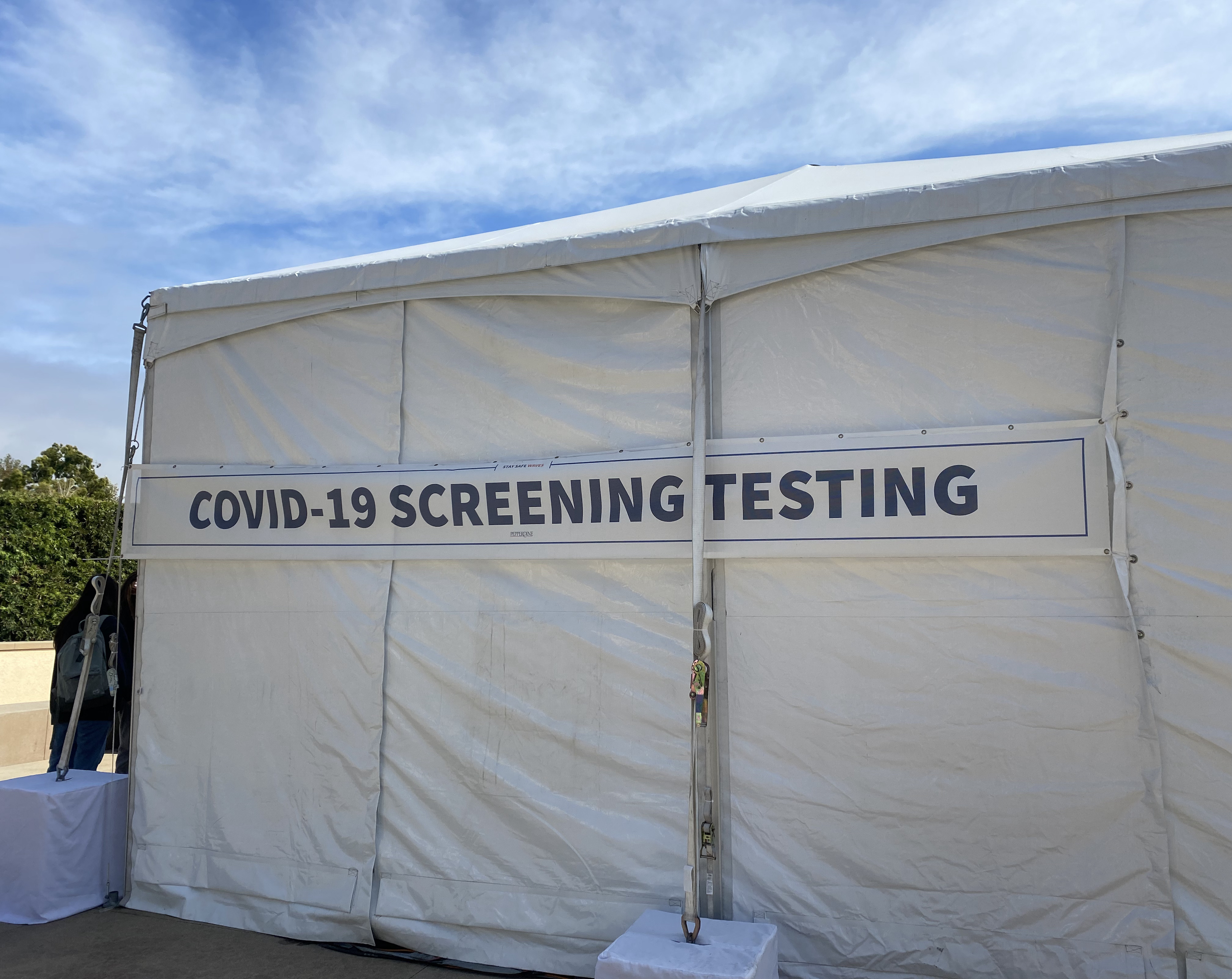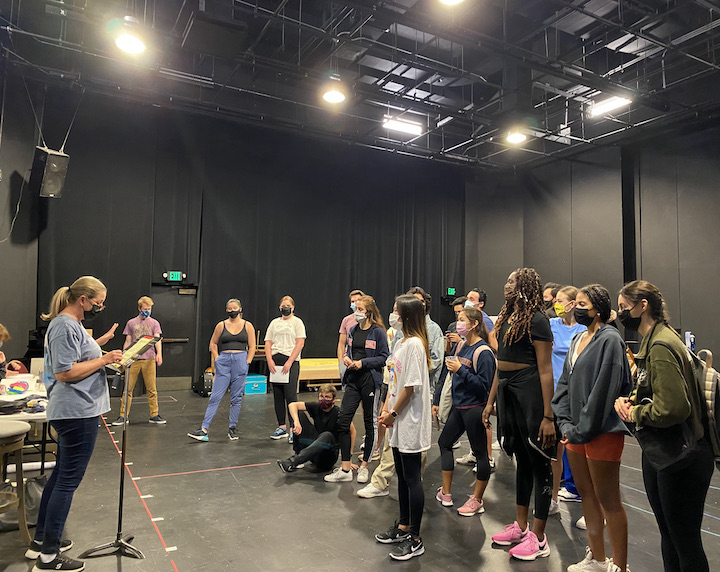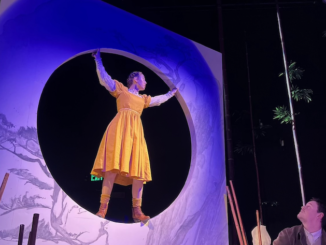
COVID-19 is no longer holding back Pepperdine theatre students and professors from doing what they love.
From March 2020 to May 2021, theatre students and professors had to say goodbye to the Pepperdine stage and accept performing and teaching from home due to the pandemic. Now that students are able to be in-person again, they are trying their best to obey the COVID-19 protocols and work with each other through the process. That, in itself, is a whole new experience, said Brad Griffin, theatre professor and the divisional dean of Fine Arts.
“We are starting totally fresh,” Griffin said. “Everybody is having to learn again to do everything.’’
Theatre students and professors said they have cherished being able to be in the same space together again, no matter what type of protocols they have to follow.
Challenges of theatre online
Theatre Professor Kelly Todd said she is happy to be back with her theatre students and having the chance to do things that were extremely hard over Zoom.
“Being able to sing together, be in a room together and make harmony,” Todd said. “There were just certain things that in the past year and a half on Zoom you couldn’t accomplish.’’
Griffin agreed that there were various challenges in doing theatre online.
“It was so much to have to think through,” Griffin said. “It was one big learning curve.’’
Over the course of the pandemic, theatre students had to learn how to navigate technology and how to adapt in building character connections through screens.
“We did four online productions,” Griffin said. “That was incredibly challenging, we were shipping ring lights, audio kits all over the country.’’
For junior theatre major Analise Avila, doing theatre online was difficult because it was hard to accept not being able to share special moments with her peers in-person.
“It was tough knowing that you are all in completely different places,” Avila said. “You didn’t have that sense of community that was able to grow as it usually does.”
For sophomore theatre major Kayla Bryant, doing theatre online was lonely. It also allowed her to adapt to a different type of theatre than she was used to.
“Having the opportunity to just send in videos or to pre-record yourself and be inserted into a show was a little different,’’ Bryant said.
First-year theatre major Isabella Camarena said it was a difficult experience being online but also helpful when it came to having to be creative when having virtual shows.
“It was very challenging,” Camarena said. “It was also very fun because we were coming up with new things we’ve never had to come up with before.’’
COVID-19 closed down theatres at all levels. Broadway re-opened Sept.14 with great fanfare, with many performers excitedly getting ready to perform well-known shows, Michael Paulson wrote in a Oct. 19 New York Times article.
Even though the pandemic is not over, many producers believe that it is time to move on from the struggles of the pandemic, and look toward a brighter future in theatre, Michael Paulson wrote in a Oct.13 New York Times article.
Cherishing theatre
Joe Mantello, a two-time Tony winning director, told the Los Angeles Times in May 2020 that he predicted that the pandemic would ultimately teach entertainers how to appreciate the craft of theatre more since they have been away for so long.
Being away from theatre in-person made students and professors value theatre more.
“I definitely think it made me value being able to be in person again,” Avila said. “It’s so much more fulfilling.’’
For senior theatre major Yayabell Debay, being away from theatre made her see how much theatre means to her.
“Coming back definitely made me cherish it more,” Debay said. “It made me love being around people more, acting with people, feeding off of people, being able to actually reach out and touch them.’’
For Camarena, live shows at Pepperdine like “We Are Proud to Present” made her realize how much she truly missed seeing live performances and how special human interaction could be.
“I was like I can’t believe how much I missed this,” Camarena said. “I forget how much it can bring together an audience and people.”
How it feels to be back
Pepperdine students and professors were excited to start a new, post-COVID chapter, but there was some nervousness about what surprises the start of the semester would hold.
“I am really excited to come back,” Griffin said. “Personally, there has been anxiety, like any other faculty member, about how is this going to work and am I gonna have students constantly in and out of my class because of quarantine.’’
Todd is directing the fall musical “Mamma Mia” with 22 students that runs from Nov. 12-20.
“It’s been going great,” Todd said. “It is such a joy to be making theatre in any capacity.’’
Debay shared her joy in being able to perform for a live audience in Pepperdine’s production of “We are Proud to Present,” which ran Sept. 28-Oct. 2.
“I like the experience of hearing the audiences’ reactions, seeing their faces as something crazy or beautiful happened on stage,” Debay said.
Theatre students said getting the chance to do in-person performances and being able to stand with one another is the best part.
“Just hearing the audiences’ reaction and having them come up to you after the show,” Camarena said. “It’s just really rewarding after not having that for a long time.’’
Bryant said she is happy to be doing what she loves again in-person.
“It is so nice to be back,” Bryant said. “It has been an electrifying experience being in company of such amazing actors and actresses and not having to do solo work.”

Obeying COVID-19 protocols
Obeying COVID-19 protocols has been crucial to enabling theatre students and professors to come back to in-person theatre.
Debay said she and her castmates from “We are Proud to Present” had to always show proof of a negative COVID-19 test and the green dot from their daily wellness check before walking into rehearsals. Each show has a paid staff member, also known as a COVID-19 compliance officer, to enforce the rules.
Theatre students have had to keep their masks on fully during rehearsals, Debay said.
If students do not comply with the COVID-19 rules, Debay said there would be risks of not being able to do a show.
Debay said she and her castmates were careful outside of theatre rehearsals to avoid anyone catching the virus and causing the show to be canceled due to quarantine rules.
“We had to get tested a lot,” Avila said.
Students have been on top of following the rules, Todd said. There have been no problems.
“They have been fantastic,” Todd said. “We wear our masks the entire time.’’
Bryant said she felt safe in rehearsals because her stage manager was alert when it came to checking each students’ green dot and enforcing mask rules.
“The only time we were able to have our masks off were the last dress rehearsal and our two runs of the show,” Bryant said.
With all the testing and protocols in place, theatre students feel less worried while doing what they love most.
“It does keep us safe, I feel very safe,” Camarena said. “It’s worth it.’’
Griffin said he appreciates that everyone has been complying with protocols.
“We’re having to adjust definitely to different guidelines, but we are making it work,’’ Griffin said.

Dealing with masks
Pepperdine’s Theatre Department has learned how to manage the challenges that come with masks, like not being able to see another’s whole face and masks slipping down.
“My job is to make sure they’re annunciating,” Todd said. “Obviously the mask muffles a little.’’
However, Todd said the masks are not as big of a challenge as they may seem because she trusts that her students are getting words in scenes right.
Theatre professors have had to adapt to coaching acting while only being able to see half their students’ faces.
Through any theatre rehearsal, there are always various eyes watching and planning out how each scene could work due to the masks, Griffin said.
“It made me act more with my eyes,” Debay said. “The first week I was so irritated because I had this extra thing.”
Camarena said dealing with masks is difficult when trying to act.
“It can lessen that connection with other actors because you can’t see the rest of their face,” Camarena said.
Avila said students have to be aware of how they do particular scenes when wearing a mask because it can sometimes move.
“If you are talking and you are really passionate about something and you’re setting the scene,” Avila said. “If your mask falls down you have to pick it back up.’’
Bryant said it can be difficult to understand what another person is saying when acting out a scene together because the mask is in the way. She said it was an interesting experience seeing the difference between rehearsals — where everyone wore masks — and shows — where they took masks off for the performances.
“There was a huge difference it felt for us between our last run with masks on and the first performance with masks off,” Bryant said. “The emotion was so much more heightened when you can see someone’s whole face.”
Performances
In the show, “Some Oral Histories of Ground Zero” that ran Oct. 8-9, Bryant said she and her ensemble had to get tested three times a week.
“The audience and everybody else running the show had to wear masks,” Bryant said.
Bryant and her castmates had to follow COVID-19 protocols during the show and even when walking up to their families.
“When we were meeting our families in the audience, we had to have our masks on,” Bryant said.
Todd said actors will test twice a week during the musical’s run so that actors can unmask for the actual performances.
“They put them right back on when they go off stage for whatever business they do backstage,” Todd said. “They take it off just before they walk on stage.”
With all the protocols in place, Todd said she feels comfortable having actors remove masks during actual performances.
“Knowing that we can move forward with taking the masks off on stage reduced a lot of my concerns about being able to put on a musical,” Todd said.
The Los Angeles County Department of Health issued these guidelines for live performance, Griffin said.
Theatre students said it was a weird experience finally seeing their ensemble members act without a mask.
Viviana Diaz completed the reporting for this story in Jour 241 under the supervision of Dr. Christina Littlefield and Dr. Theresa de los Santos. Dr. Littlefield supervised the web story.

